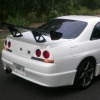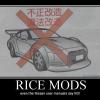Balancing Crank And Flywheel If They Are New From Nissan
Announcements
-
Similar Content
-
Latest Posts
-
That's a given! Bit hard to powdercoat it properly without removing them! 😁
-
By Dose Pipe Sutututu · Posted
No detail on compressor or turbine sizes, which doesn't help with housing size selection with that kit. However, from SR20DET mucking about and money torching perspective, a GTX2860R Gen 2 w/ 0.64 (46mm inducer) will do ~260kW on E85 about 1.5bar of boost. All in before 3000pm, which cause a gearbox to shatter. Now imagine the same turbo, on a modern motor with an extra 0.5L of displacement, and heaps of cam timing adjustability (not an on/off affair like the Nissan shit boxes). If this was my car (which I would never own or consider buying, ever!), I would go for a nice twin scroll setup, and a G30-660. Gates plumbed back, no silly shit. Lean on the cam timing, big displacement to create a flat-ish torque curve. -
This should be pretty easy. 200rwkW is just about the max power out of an RB25 stock turbo. So, 12ish psi on a 2.5L. That boost limited mainly by the prospect of seeing the turbine in the cat after the smoke show. A steel wheeled equivalent would likely happily do ~220rwkW at something like 17 psi, where it would probably be bumping into the usual limits of such a sized turbo. These things have like a .48 rear. You will not need the 0.86 rear. The 0.64 will be fine. In fact, if you were looking at various mid-200rwkW options for RBs, most of them would be in a 0.64 rear. So, I think you will definitely want to be no bigger than that for a same sized but probably even more efficient (at making power) modern engine.
-







Recommended Posts
Create an account or sign in to comment
You need to be a member in order to leave a comment
Create an account
Sign up for a new account in our community. It's easy!
Register a new accountSign in
Already have an account? Sign in here.
Sign In Now